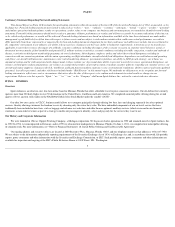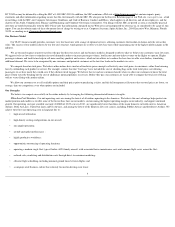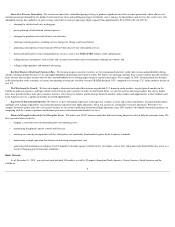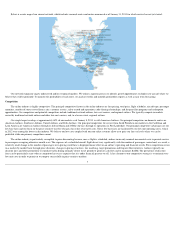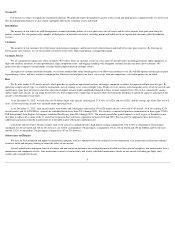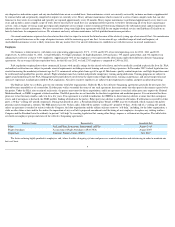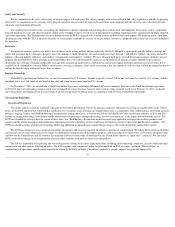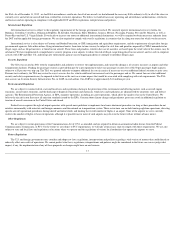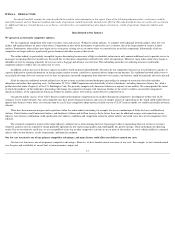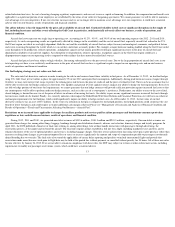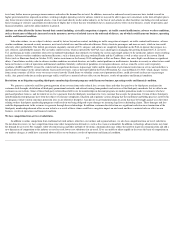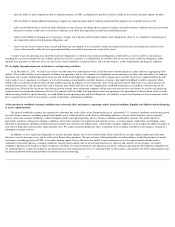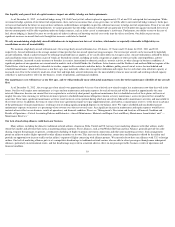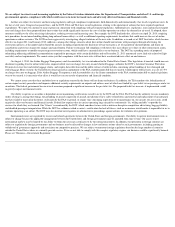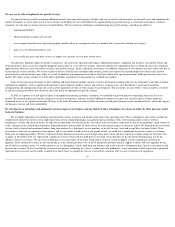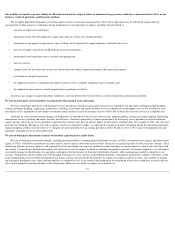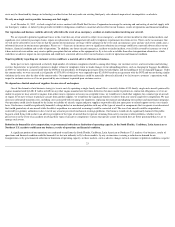Spirit Airlines 2012 Annual Report Download - page 15
Download and view the complete annual report
Please find page 15 of the 2012 Spirit Airlines annual report below. You can navigate through the pages in the report by either clicking on the pages listed below, or by using the keyword search tool below to find specific information within the annual report.
effect on our business. Moreover, we cannot assure you that compliance with these rules will not have a material adverse effect on our business. In addition, the U.S.
Congress and Federal administrative agencies have investigated the increasingly common airline industry practice of unbundling the pricing of certain products and services.
If new taxes are imposed on non-ticket revenues, or if other laws or regulations are adopted that make unbundling of airline products and services impermissible, or more
cumbersome or expensive, our business, results of operations, and financial condition could be harmed. Congressional and other government scrutiny may also change
industry practice or public willingness to pay for ancillary services. See also “—We are subject to extensive regulation by the Federal Aviation Administration, the
Department of Transportation, and other U.S. and foreign governmental agencies, compliance with which could cause us to incur increased costs and adversely affect our
business and financial results.”
The airline industry is particularly sensitive to changes in economic conditions. Continued adverse economic conditions or a reoccurrence of such conditions would
negatively impact our business, results of operations and financial condition.
Our business and the airline industry in general are affected by many changing economic conditions beyond our control, including, among others:
These factors can adversely affect, and from time to time have adversely affected, our results of operations, our ability to obtain financing on acceptable terms and our
liquidity. Unfavorable general economic conditions, such as higher unemployment rates, a constrained credit market, housing-related pressures and increased focus on
reducing business operating costs can reduce spending for price-sensitive leisure and business travel. For many travelers, in particular the price-sensitive travelers we serve,
air transportation is a discretionary purchase that they may reduce or eliminate from their spending in difficult economic times. The overall decrease in demand for air
transportation in the United States in 2008 and 2009 resulting from record high fuel prices and the economic recession required that we take significant steps to reduce our
capacity, which reduced our revenues. Unfavorable economic conditions could also affect our ability to raise prices to counteract increased fuel, labor or other costs,
resulting in a material adverse effect on our business, results of operations, and financial condition.
The airline industry faces ongoing security concerns and related cost burdens, further threatened or actual terrorist attacks, or other hostilities that could
significantly harm our industry and our business.
The terrorist attacks of September 11, 2001 and their aftermath negatively affected the airline industry. The primary effects experienced by the airline industry
included:
Since September 11, 2001, the Department of Homeland Security and the Transportation Security Administration, or TSA, have implemented numerous security
measures that restrict airline operations and increase costs, and are likely to implement additional measures in the future. For example, following the widely publicized
attempt of an alleged terrorist to detonate plastic explosives hidden underneath his clothes on a Northwest Airlines flight on Christmas Day in 2009, passengers became
subject to enhanced random screening, which may include pat-downs, explosive detection testing or body scans. Enhanced passenger screening, increased regulation
governing carry-on baggage and other similar restrictions on passenger
14
•
changes and volatility in general economic conditions, including the severity and duration of any downturn in the U.S. or global economy and financial markets;
• changes in consumer preferences, perceptions, spending patterns or demographic trends, including any increased preference for higher-fare carriers offering higher
amenity levels, and reduced preferences for low-fare carriers offering more basic transportation, during better economic times;
•
higher levels of unemployment and varying levels of disposable or discretionary income;
•
depressed housing and stock market prices; and
•
lower levels of actual or perceived consumer confidence.
•
substantial loss of revenue and flight disruption costs caused by the grounding of all commercial air traffic in or headed to the United States by the Federal Aviation
Administration, or FAA, for about three days after the terrorist attacks;
•
increased security and insurance costs;
•
increased concerns about future terrorist attacks;
•
airport shutdowns and flight cancellations and delays due to security breaches and perceived safety threats; and
•
significantly reduced passenger traffic and yields due to the subsequent dramatic drop in demand for air travel.


